Politics
Poor NHS maternity care in danger of becoming normalised, regulator warns | Women’s health
Maternity services in England are so inadequate that cases of women receiving poor care and being harmed in childbirth are in danger of becoming “normalised”, the NHS regulator has said.
A Care Quality Commission (CQC) report based on inspections of 131 maternity units sets out an array of problems, adding to the sense of crisis that has enveloped an NHS service that cares for the 600,000 women a year who give birth and their babies.
The watchdog’s grim findings came as Wes Streeting, the health secretary, admitted he felt acute anxiety about “the risk of disaster greeting women in labour tomorrow”.
In its report, the CQC says problems in maternity care are so ingrained that:
-
Some women, frustrated at facing such long delays in being assessed at triage, discharge themselves before they are seen.
-
65% of units are not safe for women to give birth in, 47% of trusts are rated as requiring improvement on safety and another 18% are rated as inadequate.
-
Some hospitals do not record incidents that have resulted in serious harm.
-
There is a widespread lack of staff and in some places a lack of potentially life-saving equipment.
-
Hospitals do not always consider women’s suffering after receiving poor care.
Nicola Wise, the CQC’s director of secondary and specialist care, said: “We cannot allow an acceptance of shortfalls that are not tolerated in other services.”
She said it was vital that the NHS ensures “that poor care and preventable harm do not become normalised, and that staff are supported to deliver the high-quality care they want to provide for mothers and babies today and in the future”.
Streeting underlined the seriousness of what he called the crisis in maternity care at an event on Wednesday to launch a report by the IPPR thinktank on improving health in the UK.
“When it comes to the crisis in our maternity services across the country, it is one of the biggest issues that keeps me awake at night, worrying about the quality of care being delivered today [and] at the risk of disaster greeting women in labour tomorrow,” he said. “I think that what we have seen, in the case of specific trusts, are problems and risk factors that exist right across maternity services across the country.”
He also said the dire state of the public finances that the Labour government had inherited meant it could not extend free school meals to every primary school child in England. Last week the Child Poverty Action Group, the Royal College of Paediatrics and Child Health and the National Education Union urged ministers to take that step in order to reduce the number of children who do not have enough to eat and also the rising numbers who are overweight.
Streeting emphasised Labour’s determination to address the UK’s status as “the sick man of Europe” through concerted action on public heath.
“I think we are in this appalling situation when we are living longer but becoming sick sooner. That’s terrible for the quality of life, it’s also terrible for the country, for the labour market and for the financial sustainability of our health and care services,” he said.
However, he added that despite Labour’s plans to reduce the burden of killer diseases, he would not become “the fun police” and start checking what people were eating and drinking.
In better news for the NHS, it has won praise from the Commonwealth Fund, a US-based global health thinktank. It judged that despite its woes it was the third best system out of 10 it analysed, especially because it provides care that is universal and free to obtain at the point of need.
“The NHS may be in deep trouble right now from a UK perspective, but it is all relative. The US is worse on nearly all accounts,” said the report’s co-author Reginald Williams II. “While waitlists may be an issue and facilities need upgrades, the cost of health is not bankrupting individuals [as it is in the US].”
Politics
Sue Gray’s salary isn’t the problem – it’s the backstage power struggle Starmer cannot afford | Simon Jenkins
The most remarkable feature of the Sue Gray saga is not how much the Downing Street chief of staff earns, but how little Britain’s prime minister does. Keir Starmer gets just £166,786, which is about £3,000 less than Gray. But then she gets less than many permanent secretaries, not to mention the consultants and lawyers Whitehall is crawling with these days. Besides, as we are tired of hearing, Starmer gets dazzling benefits in kind.
A second feature of the saga is its mess. Just 12 weeks into the rosy dawn of a new Labour era, Downing Street is enmeshed in a spat more typical of a regime on its last legs. Starmer has spent his time in office telling Britons they face a shambles, requiring a clampdown on public spending. The new army of special advisers – approximately 70-strong – is duly being paid a relative pittance, but one that has been fixed by a boss who decided to take a thumping pay rise. To put it mildly, this suggests poor political judgment. As one insider joked, Gray is the only pensioner likely to do better under Labour.
Fixing the machinery of Downing Street is the first crucial job of a new prime minister. Starmer has hit the ground stumbling. It is customary for those closest to the leader’s ear to be a circle of trusted friends ready to act as his alter ego. This was true back in the days of Thatcher and certainly of Tony Blair. When Blair came to power, his senior aide Jonathan Powell said to expect “a change from a feudal system of barons to a more Napoleonic system”. What he meant was a downgrading of the traditional civil service hierarchy, one of permanent secretaries with the cabinet secretary at their head. Instead, government was conducted more informally, from “the sofa”, as Kenneth Clarke dismissively described it.
This had benefits. Under Thatcher, the civil service acted initially as a brake on change, but she eventually gathered loyalists round her and bent the system to her will. Although she still listened to advice, as when in 1988 she did a U-turn on NHS privatisation. Under Blair, media management from the sofa overwhelmed policy. Foreign Office advice on Iraq was suppressed, and Blair made his greatest mistake with the invasion of that country. Since then, the balance in Downing Street between politicians and officials has become ever more informal and sometimes fractious. It reached its nadir under Boris Johnson and his maverick aide Dominic Cummings.
A measure of the disruption was that internal pressure succeeded in evicting Cummings, but when dissent occurred under Liz Truss, it was politics that evicted the head of the Treasury, Tom Scholar. In the case of Gray, it seems that an early victim of her boisterous style will be the cabinet secretary, Simon Case. She is already reported as controlling access to security briefings, appointing close allies as civil servants and pushing her pet building projects. This may be fine if you can keep it secret, but not if those round you keep leaking.
Gray was a civil servant who became a political adviser. They are different professions. Civil servants have spent their careers working together, with Downing Street and the Cabinet Office at the peak. They are supposedly discreet suppliers of truth to power. Political advisers are rarely used to big organisations. They are mostly the beneficiaries of party patronage, thinktanks and the murky world of lobbying. Some fit in; others do not.
The most recent grit in this machine has come from the growth of the No 10 Policy Unit, staffed by special advisers. Its proclaimed purpose is to keep Whitehall to the manifesto straight and narrow. But it inevitably cuts across similar units in departments, also staffed by advisers. It was war between the two top units – and Cummings’ reported desire to have Treasury advisers dismissed – that forced Johnson’s chancellor Sajid Javid to resign. So critical is this relationship in the realm of economic policy, that Starmer’s No 10 unit has apparently been downgraded. It will reportedly be just “a point of contact” on economic policy, “more like the nervous system than the brain”. We await the outcome with interest.
It is easy to adapt Tolstoy and say that every unhappy Downing Street is unhappy in its own way. But unhappiness starts at the top. Starmer must now support Gray to the hilt. She must at least have her own colleagues loyal to her – and to her confidences. At the same time, prime ministers have clearly strayed too far in the direction of Blair’s Napoleon. Second opinions must get through to a leader making decisions, even if the civil service must ultimately obey and deliver. Dissent should not take the current form of media leaks and disloyal gossip.
There has to be virtue in a well-established architecture of public administration. So much of this has now broken down. That is why there must be a tilt back to the tradition of a formalised and articulate civil service, with the cabinet secretary at its apex. The satire Yes Minister portrayed civil servants as subjecting the ambition of ministers to pragmatic reality. It had its virtues, and the civil servants did not always win. It is worth a repeat.
Politics
Biden Fed Jay Powell meeting Oval Office
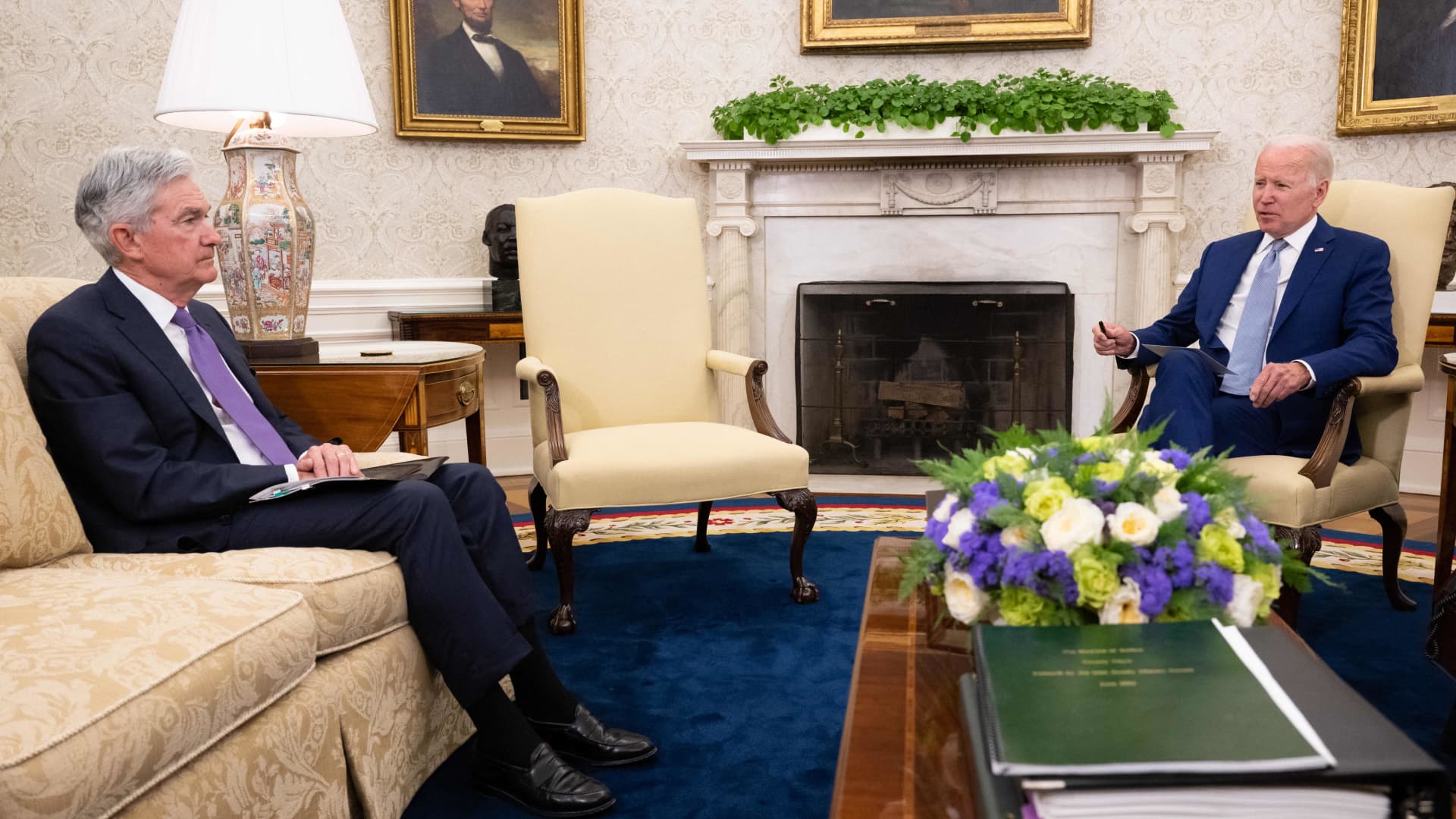
Chairman of the Federal Reserve Jerome Powell (left) meets with President Joe Biden in the Oval Office on May 31, 2022.
Saul Loeb | AFP | Getty Images
President Joe Biden on Thursday said he had “never once spoken” to Federal Reserve Chair Jerome Powell while he was president.
But the pair, joined by Treasury Secretary Janet Yellen, met in the Oval Office on May 31, 2022 to discuss inflation, photos and videos from the meeting show.
The president made the inaccurate claim during remarks at the Economic Club of Washington, D.C., the day after the Fed announced a decision to cut interest rates by 50 basis points.
Touting his own respect for the independence of the central bank, Biden said “By the way, I’ve never once spoken to the chairman of the Fed since I became president.”
Asked about the apparently inaccurate recollection by a reporter at Thursday’s White House press briefing, Council of Economic Advisors Chair Jared Bernstein said Biden had been referring only to discussions about interest rates.
“The president was saying that he has not spoken to Chair Powell about interest rates,” said Bernstein. “He did not pressure Powell and has never done so.”
But the error undercut Biden’s critique of Republican former President Donald Trump, who has threatened to challenge the independence of the Federal Reserve if he is elected to a second term.
“Unlike my predecessor, I respect the Federal Reserve’s independence as they pursue its mandate to bring inflation down. That independence has served the country well,” Biden said Thursday.
“It would also do enormous damage to our economy that independence was ever lost.”
Even in his 2022 Oval Office meeting with Powell, Biden stressed the importance of the Fed’s independence in addressing inflation.
“My plan to address inflation starts with a simple proposition: Respect the Fed. Respect the Fed’s independence,” Biden said at the time. “My job as president is not to not only nominate highly qualified individuals for that institution, but to give them the space they need to do their job.”
Trump, the Republican nominee for president, said in August that presidents should “have at least [a] say” about the Fed’s decisions on interest rates.
“Yeah, I feel that strongly,” Trump said at a Mar-a-Lago press conference on Aug. 8.
“I think that in my case, I made a lot of money, I was very successful, and I think I have a better instinct than, in many cases, people that would be on the Federal Reserve or the chairman.”
The Wall Street Journal reported earlier this year that Trump advisors were putting together a plan that would inject Trump into the Fed’s interest rate decision-making process, if the Republican returns to the White House in January.
Politics
With a lust for freebies and hobbled by infighting, Labour look like the Tories 2.0 | John Crace
During the last election campaign it was hard to escape the impression that, whatever his other faults, Rishi Sunak just wasn’t very good at politics. The charge sheet included getting drenched announcing the election and leaving D-day veterans on the beaches. And insisting that black was white: that he was stopping the boats, that the economy was in good shape, that the Tories were on course for victory.
Just a couple of months later, it very much feels like Keir Starmer and Labour are saying: “Hold my beer.” Keen to prove that they, too, are amateurs at the political PR game. It’s almost as if there is something about being in government that makes fools of everyone. Though few would have imagined that Labour could manage it quite so quickly. A period of grace would have been more fitting.
Take the freebies. And Keir has. The Arsenal tickets. The Taylor Swift tickets. The suits. The designer glasses. The clothes for his wife. Starmer’s big shtick was that he was going to do politics differently. The antidote to Tory corruption and scandal. A man who could be trusted. He was one of us. So why put himself in a position where you can so easily be criticised by the rightwing press?
If you want to set yourself up as a model of propriety then you can’t start making exceptions. Especially not so early on. A couple of years in and people may not notice so much. You have to be above reproach. Yes, it might be a loss not to go to the football. And you might resent having to buy a few more suits for yourself. But that all rather goes with the job. Being prime minister may be a career highlight for a politician but you have to take the downsides.
Perhaps Starmer has been too honest for his own good. Maybe he should have been more like Boris Johnson. Keir has made himself accountable by listing his freebies in detail. We know exactly where all the money went. With Boris we are largely in the dark. He took whopping gifts from all sorts of undesirables and we aren’t entirely sure of the details. Being prime minister was a licence for Boris to cash in. No one expected any different from him. He never pretended to be on the side of the angels.
Then there is the question of Sue Gray’s pay. You could say that someone should have suggested that Sue drop £4,000 in salary just for appearances. So she earned less than the prime minister. Maybe throw in a clothes allowance and an events expense account to make up the difference. No one will notice. Surely. I guess she is a tough negotiator. One of the reasons she was made chief of staff.
But all this is not really the point. The issue is why the Labour party is indulging in open feuds with itself by leaking the story in the first place. We were promised a government of service and yet it already appears to be totally dysfunctional. It’s as if Starmer has taken the Tories as his role model. How did it come to this that half of the No 10 top team hate the other half? And vice versa. Couldn’t someone have just got in a therapist? Or at the very least established a workplace culture where people talked to one another? Or – and here’s a thought – pay junior staff the proper rate?
Still, Keir isn’t entirely a slow learner. There’s a tradition that prime ministers do a round of regional radio stations on the Thursday before a party conference. But after the last two years, when Liz Truss and Sunak had an hour they would rather forget, Starmer decided to reset the format to pre-recorded outings where he hoped there would be less room for disaster. All the interviews would be released at 5pm when he hoped no one would be watching.
So it was left to the business secretary, Jonathan Reynolds, to do the morning media round. An experience he would rather forget. Reynolds comes across as a decent man but too much more of this and he will find himself Labour’s answer to Mel Stride. The minister who gets to do the rubbish jobs that no one else will. In future, on days like this, I am sure he will learn to put his phone on mute and not take calls from the No 10 comms team. It’s early days, I suppose.
On Times Radio, Aasmah Mir cut to the chase. Why did Starmer accept so many freebies? Reynolds forgot to engage his brain. It was like this, he said. Politicians get invited to events all the time and it would be rude not to go. It was the way people tried to engage with decision makers. Sure thing. That’s why it was vital for Boris Johnson to accept a freebie to Evgeny Lebedev’s party in Italy. And a Taylor Swift concert is a prerequisite for stopping the winter fuel allowance.
It very much sounded as if he was talking about the perks of the job, said Mir. Oh no, replied Reynolds. Far from it. Perish the thought. Just that politicians worked extremely hard and deserved a little downtime. Especially if they didn’t have to pay for it. The thought occurred that if Starmer was desperate to see Arsenal he could have afforded the cost of a seat with the corporates. It was just strange that all these dazzling freebies were never offered to the rest of us.
Over on Sky, Kay Burley was outraged by the size of Sue Gray’s salary. One wonders what Burley’s wedge is. I’m not sure she would get out of bed for £170,000. She would consider that an insult. But I’m sure that’s not the point. Even so, Reynolds still couldn’t think straight. Why not just say that Dominic Cummings and other Downing Street heads of staff would have been on a similar sort of salary if you allowed for inflation. The same people outraged now were not outraged then. It could just be that £170,000 is the going rate for the job and that it is the prime minister who is underpaid. A thought.
So the nonsense will continue into the Labour party conference starting this weekend. And Labour really doen’t have anyone to blame but itself. Freebies and staff pay should have been headed off ages ago. And maybe it doesn’t matter if we have a government that is bad at politics if it gets the big calls right. After all, the chances are we’ll be talking about something else in a month’s time. Head down and onwards and sideways.
Politics
Home Office urged to scrap long, expensive and ‘racist’ visa route | Immigration and asylum
A long and expensive visa route for immigrants has been called racist after analysis showed most applicants who feel forced to go through it are people of colour.
The “10-year route” visa is used by hundreds of thousands of people who are not eligible for other immigration schemes because of a lack of income or professional qualifications. Many work in low-paid jobs, such as cleaning or care work. Other common routes to settlement in the UK take five years.
According to freedom of information data obtained by the charity Ramfel, there are 218,110 people on the 10-year route.
Guardian analysis of Home Office data showed that all but one country in the top 10 nationalities who felt forced to use this route were those with predominantly minority ethnic populations. The top five were Nigeria, Pakistan, India, Ghana and Bangladesh. Overall, 86% using the route were from Asian or African countries, while 6% were from Europe.
People seeking to gain a visa via the 10-year route must renew their leave to remain with the Home Office every 30 months, meaning four renewals. The fee for each renewal is £3,850. The Home Office can grant a fee waiver but many requests are refused.
According to a 2023 report on the 10-year route by the legal advice and support service Greater Manchester Immigration Aid Unit (GMIAU), the thinktank the Institute for Public Policy Research and the charity Praxis, the most common way of covering the fees was to borrow money, leaving many people in debt and struggling to pay for basic living costs.
A 41-year-old woman from Ghana said she was struggling with the 10-year route. She has a British child, who was born in 2017, and was granted leave on the 10-year route in 2018 after applying. But she was several weeks late in applying to renew her leave in March this year and has become an overstayer awaiting a new decision from the Home Office.
Because of her late application, she has lost the years accrued and has to restart the 10-year route from day one. “This immigration route is brutal. It makes me feel like I’m in a prison. I want to go to university and qualify as a nurse but I can’t do that until my immigration status is sorted out. The government should at least change this route to five years, not 10,” she said.
A GMIAU spokesperson said: “These numbers confirm what people on the 10-year route already know: it is a racist policy. People are being driven into debt, forced to choose between paying thousands of pounds in visa fees to keep their legal status and keeping their families fed and warm.
“Ten years is far too long for anyone to wait to settle. The route must be scrapped. A good place to start would be to cap all routes to settlement at five years.”
after newsletter promotion
Nick Beales, of Ramfel, said: “The 10-year route is an enduring legacy of the hostile environment. Like many other Conservative policies from this period, the racist intent is clear, with African and south Asian nationals far more likely to be placed on this arduous and often brutal route towards securing permanent immigration status.”
A Home Office spokesperson said: “In cases where a family does not qualify for a five-year route, but where refusal would breach obligations under the European convention on human rights, the Home Office places them on a 10-year route. Neither the race, ethnicity, nor nationality of an applicant is a factor in the decision to place individuals on this route.
“We encourage all individuals to apply for any visa renewals prior to their leave to remain ending in the UK.”
Politics
Domestic abuse experts to be embedded in 999 control rooms

 West Midlands Police/PA
West Midlands Police/PADomestic abuse specialists will be embedded in 999 control rooms in England and Wales as part of the government’s pledge to halve violence against women and girls in a decade.
The measure is part of “Raneem’s Law” in memory of Raneem Oudeh, 22, and her mother Khaola Saleem who were murdered by Ms Oudeh’s estranged husband in 2018.
The government also announced a new domestic abuse protection order pilot that will order more abusers to stay away from victims and impose tougher sanctions if they fail to do so.
Home Secretary Yvette Cooper said victims “need to know the police will be there for them” and if they come forward, any report “will be treated with the seriousness and urgency it deserves”.
“Failure to understand the seriousness of domestic abuse costs lives and far too many have already been lost,” Ms Cooper said.
The aim is for specialists with expertise in domestic abuse to be on hand in control rooms to ensure victims get a fast response from officers on the ground and are quickly referred to support services.
The scheme will be piloted in select police forces from early next year. Details on which forces are taking part in the pilot have not yet been announced.
Ms Cooper described the new measures as “vital” and “a personal priority for me”.
She told the BBC’s Laura Kuenssberg in January about her plans for the measures, which Labour also proposed in February.
Almost 100 domestic abuse-related offences were recorded by police every hour on average last year, the government said.
On the night Ms Oudeh and her mother were killed, she rang 999 multiple times, but officers failed to reach the two women in time.
In total, 13 reports were made to the police about concerns for her safety – but no arrests were made until it was too late.
An inquest found police errors “materially contributed” to their deaths. West Midlands Police has since apologised to the family.
Nour Norris, Ms Oudeh’s aunt and Mrs Saleem’s sister, said having domestic abuse specialists in control rooms would “save lives by making sure no warning signs are ignored, unlike in Raneem’s story”.
“Their suffering and the way the system failed them is something I will never forget,” Ms Norris said. “What started as a quest for justice for my family became a mission to improve outcomes for all domestic abuse victims everywhere.”
Ms Oudeh’s estranged husband, Janbaz Tarin, was jailed for a minimum of 32 years in December 2018, after admitting to the murders.
In another effort to protect women and girls, the government also announced a new domestic abuse protection order pilot that will start in November.
Police already have the power to legally order abusers not to contact or go within a certain distance of victims for up to 28 days.
The pilot will introduce no maximum time limit for orders, impose electronic tagging of offenders and require perpetrators to notify police of any change in name or address.
The new orders will cover all forms of domestic abuse, including violence, stalking and controlling behaviour.
Breaching an order will be a criminal offence punishable by up to five years in prison.
Victims and other third parties such as charities will also be able to apply directly for an order, rather than having to rely on police and criminal courts.
The new domestic abuse protection orders will be piloted by officers in Greater Manchester Police, the Metropolitan Police (South London Borough Command Unit) and British Transport Police.
Refuge, the charity which supports survivors of domestic violence, welcomed the changes but called for “far more detail on how these plans will be implemented and how staff will be safely recruited, vetted and most importantly trained”.
Refuge’s interim chief executive Abigail Ampofo warned that police rarely act on breaches of existing protection orders, making them often “worth little more than the paper they are written on”.
“We need a real sea change in internal policing culture and the police forces’ response to domestic abuse overall,” said Ms Ampofo.
Politics
Ben Jennings on Keir Starmer accepting hospitality tickets at Arsenal – cartoon
-

 Sport7 hours ago
Sport7 hours agoJoshua vs Dubois: Chris Eubank Jr says ‘AJ’ could beat Tyson Fury and any other heavyweight in the world
-

 News1 day ago
News1 day agoYou’re a Hypocrite, And So Am I
-

 Technology6 hours ago
Technology6 hours agoiPhone 15 Pro Max Camera Review: Depth and Reach
-

 News8 hours ago
News8 hours agoIsrael strikes Lebanese targets as Hizbollah chief warns of ‘red lines’ crossed
-

 Sport7 hours ago
Sport7 hours agoUFC Edmonton fight card revealed, including Brandon Moreno vs. Amir Albazi headliner
-

 CryptoCurrency6 hours ago
CryptoCurrency6 hours agoEthereum is a 'contrarian bet' into 2025, says Bitwise exec
-
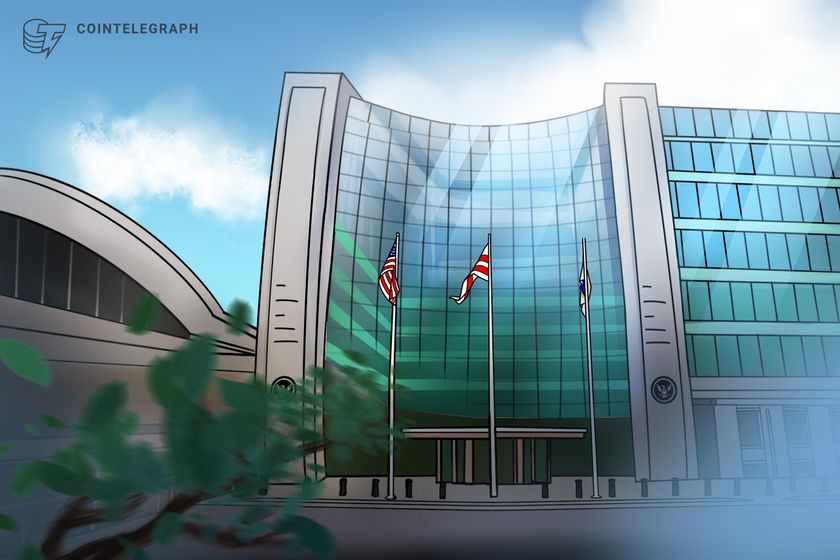
 CryptoCurrency7 hours ago
CryptoCurrency7 hours agoSEC settles with Rari Capital over DeFi pools, unregistered broker activity
-

 News5 hours ago
News5 hours agoBrian Tyree Henry on voicing young Megatron, his love for villain roles
-

 CryptoCurrency7 hours ago
CryptoCurrency7 hours ago2 auditors miss $27M Penpie flaw, Pythia’s ‘claim rewards’ bug: Crypto-Sec
-

 CryptoCurrency7 hours ago
CryptoCurrency7 hours agoArthur Hayes’ ‘sub $50K’ Bitcoin call, Mt. Gox CEO’s new exchange, and more: Hodler’s Digest, Sept. 1 – 7
-

 CryptoCurrency7 hours ago
CryptoCurrency7 hours agoTreason in Taiwan paid in Tether, East’s crypto exchange resurgence: Asia Express
-

 CryptoCurrency7 hours ago
CryptoCurrency7 hours agoLeaked Chainalysis video suggests Monero transactions may be traceable
-

 CryptoCurrency7 hours ago
CryptoCurrency7 hours agoJourneys: Robby Yung on Animoca’s Web3 investments, TON and the Mocaverse
-

 CryptoCurrency7 hours ago
CryptoCurrency7 hours agoLouisiana takes first crypto payment over Bitcoin Lightning
-

 CryptoCurrency7 hours ago
CryptoCurrency7 hours agoAre there ‘too many’ blockchains for gaming? Sui’s randomness feature: Web3 Gamer
-

 CryptoCurrency7 hours ago
CryptoCurrency7 hours agoCrypto whales like Humpy are gaming DAO votes — but there are solutions
-

 CryptoCurrency7 hours ago
CryptoCurrency7 hours agoHelp! My parents are addicted to Pi Network crypto tapper
-

 CryptoCurrency7 hours ago
CryptoCurrency7 hours ago$12.1M fraud suspect with ‘new face’ arrested, crypto scam boiler rooms busted: Asia Express
-

 CryptoCurrency7 hours ago
CryptoCurrency7 hours ago‘Everything feels like it’s going to shit’: Peter McCormack reveals new podcast
-

 CryptoCurrency7 hours ago
CryptoCurrency7 hours agoSEC sues ‘fake’ crypto exchanges in first action on pig butchering scams
-

 CryptoCurrency7 hours ago
CryptoCurrency7 hours agoFed rate cut may be politically motivated, will increase inflation: Arthur Hayes
-

 CryptoCurrency7 hours ago
CryptoCurrency7 hours agoDecentraland X account hacked, phishing scam targets MANA airdrop
-

 CryptoCurrency7 hours ago
CryptoCurrency7 hours agoBinance CEO says task force is working ‘across the clock’ to free exec in Nigeria
-

 CryptoCurrency7 hours ago
CryptoCurrency7 hours agoBitcoin price hits $62.6K as Fed 'crisis' move sparks US stocks warning
-

 CryptoCurrency7 hours ago
CryptoCurrency7 hours agoCZ and Binance face new lawsuit, RFK Jr suspends campaign, and more: Hodler’s Digest Aug. 18 – 24
-

 CryptoCurrency7 hours ago
CryptoCurrency7 hours agoBitcoin miners steamrolled after electricity thefts, exchange ‘closure’ scam: Asia Express
-

 CryptoCurrency7 hours ago
CryptoCurrency7 hours agoCardano founder to meet Argentina president Javier Milei
-

 CryptoCurrency7 hours ago
CryptoCurrency7 hours agoCertiK Ventures discloses $45M investment plan to boost Web3
-

 CryptoCurrency7 hours ago
CryptoCurrency7 hours agoMemecoins not the ‘right move’ for celebs, but DApps might be — Skale Labs CMO
-

 CryptoCurrency7 hours ago
CryptoCurrency7 hours agoDorsey’s ‘marketplace of algorithms’ could fix social media… so why hasn’t it?
-

 CryptoCurrency7 hours ago
CryptoCurrency7 hours agoTelegram bot Banana Gun’s users drained of over $1.9M
-

 CryptoCurrency7 hours ago
CryptoCurrency7 hours agoLow users, sex predators kill Korean metaverses, 3AC sues Terra: Asia Express
-

 CryptoCurrency7 hours ago
CryptoCurrency7 hours agoSEC asks court for four months to produce documents for Coinbase
-

 CryptoCurrency7 hours ago
CryptoCurrency7 hours agoBlockdaemon mulls 2026 IPO: Report
-

 News5 hours ago
News5 hours ago“Beast Games” contestants sue MrBeast’s production company over “chronic mistreatment”
-

 Technology3 days ago
Technology3 days agoYouTube restricts teenager access to fitness videos
-

 Science & Environment10 hours ago
Science & Environment10 hours ago‘Running of the bulls’ festival crowds move like charged particles
-
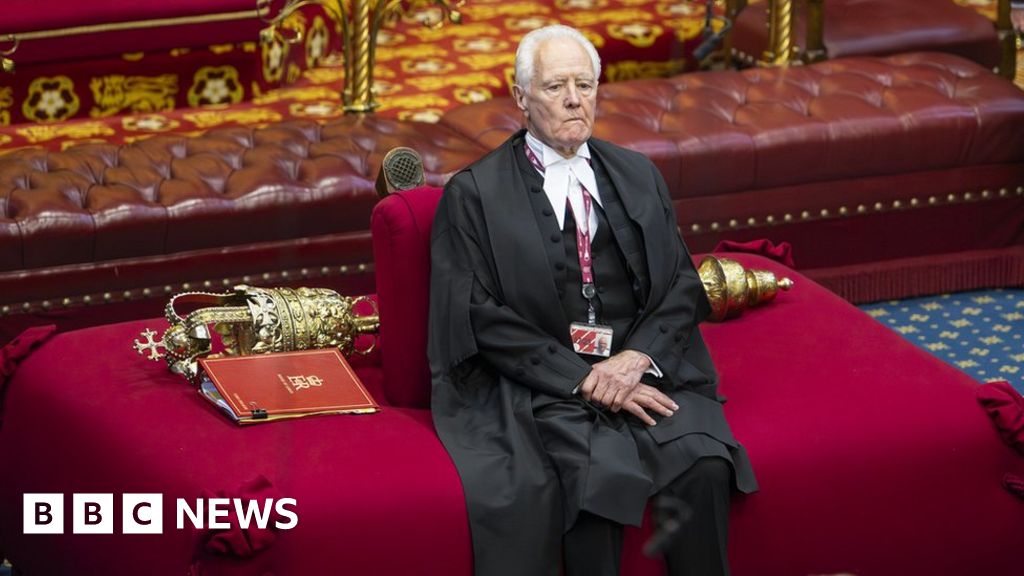
 Politics21 hours ago
Politics21 hours agoWhat is the House of Lords, how does it work and how is it changing?
-

 MMA7 hours ago
MMA7 hours agoUFC’s Cory Sandhagen says Deiveson Figueiredo turned down fight offer
-

 MMA7 hours ago
MMA7 hours agoDiego Lopes declines Movsar Evloev’s request to step in at UFC 307
-

 Football6 hours ago
Football6 hours agoNiamh Charles: Chelsea defender has successful shoulder surgery
-

 Football6 hours ago
Football6 hours agoSlot's midfield tweak key to Liverpool victory in Milan
-

 Science & Environment10 hours ago
Science & Environment10 hours agoRethinking space and time could let us do away with dark matter
-

 Science & Environment10 hours ago
Science & Environment10 hours agoHow one theory ties together everything we know about the universe
-

 Entertainment5 hours ago
Entertainment5 hours ago“Jimmy Carter 100” concert celebrates former president’s 100th birthday
-

 News5 hours ago
News5 hours agoJoe Posnanski revisits iconic football moments in new book, “Why We Love Football”
-

 Science & Environment20 hours ago
Science & Environment20 hours agoQuantum to cosmos: Why scale is vital to our understanding of reality
-

 Science & Environment21 hours ago
Science & Environment21 hours agoQuantum time travel: The experiment to ‘send a particle into the past’
-

 Science & Environment18 hours ago
Science & Environment18 hours agoDoughnut-shaped swirls of laser light can be used to transmit images
-

 Science & Environment16 hours ago
Science & Environment16 hours agoThe galactic anomalies hinting dark matter is weirder than we thought
-

 Science & Environment7 hours ago
Science & Environment7 hours agoWe may have spotted a parallel universe going backwards in time
-

 CryptoCurrency7 hours ago
CryptoCurrency7 hours agoTelegram CEO cannot leave France, OpenSea receives Wells notice, and more: Hodler’s Digest, Aug. 25 – 31
-

 CryptoCurrency7 hours ago
CryptoCurrency7 hours agoFive crypto market predictions that haven’t come true — yet
-

 CryptoCurrency7 hours ago
CryptoCurrency7 hours agoSolana unveils new Seeker device, says it’s not just a ‘memecoin phone’
-

 CryptoCurrency7 hours ago
CryptoCurrency7 hours agoCrypto scammers orchestrate massive hack on X but barely made $8K
-

 CryptoCurrency7 hours ago
CryptoCurrency7 hours agoBitcoiners are ‘all in’ on Trump since Bitcoin ’24, but it’s getting risky
-

 CryptoCurrency7 hours ago
CryptoCurrency7 hours agoReal-world asset tokenization is the crypto killer app — Polygon exec
-

 Science & Environment10 hours ago
Science & Environment10 hours agoJupiter’s stormy surface replicated in lab
-

 Science & Environment10 hours ago
Science & Environment10 hours agoFuture of fusion: How the UK’s JET reactor paved the way for ITER
-

 CryptoCurrency7 hours ago
CryptoCurrency7 hours agoBitcoin bull rally far from over, MetaMask partners with Mastercard, and more: Hodler’s Digest Aug 11 – 17
-

 CryptoCurrency7 hours ago
CryptoCurrency7 hours agoVonMises bought 60 CryptoPunks in a month before the price spiked: NFT Collector
-

 CryptoCurrency7 hours ago
CryptoCurrency7 hours agoVitalik tells Ethereum L2s ‘Stage 1 or GTFO’ — Who makes the cut?
-

 CryptoCurrency7 hours ago
CryptoCurrency7 hours agoEthereum falls to new 42-month low vs. Bitcoin — Bottom or more pain ahead?
-
Business6 hours ago
Thames Water seeks extension on debt terms to avoid renationalisation
-
Business6 hours ago
How Labour donor’s largesse tarnished government’s squeaky clean image
-
Business5 hours ago
UK hospitals with potentially dangerous concrete to be redeveloped
-
Business5 hours ago
Axel Springer top team close to making eight times their money in KKR deal
-

 News5 hours ago
News5 hours agoSean “Diddy” Combs denied bail again in federal sex trafficking case
-

 News5 hours ago
News5 hours agoSean “Diddy” Combs denied bail again in federal sex trafficking case in New York
-

 News5 hours ago
News5 hours agoBrian Tyree Henry on his love for playing villains ahead of “Transformers One” release
-

 News5 hours ago
News5 hours agoBrian Tyree Henry on voicing young Megatron, his love for villain roles
-
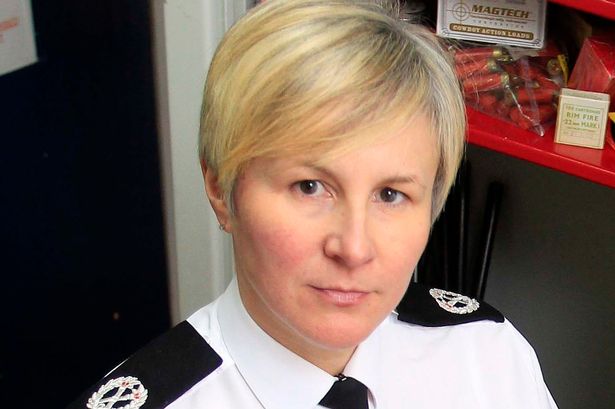
 News9 hours ago
News9 hours agoPolice chief says Daniel Greenwood 'used rank to pursue junior officer'
-

 News9 hours ago
News9 hours agoChurch same-sex split affecting bishop appointments
-

 Politics2 days ago
Politics2 days agoTrump says he will meet with Indian Prime Minister Narendra Modi next week
-

 Science & Environment10 hours ago
Science & Environment10 hours agoPhysicists have worked out how to melt any material
-
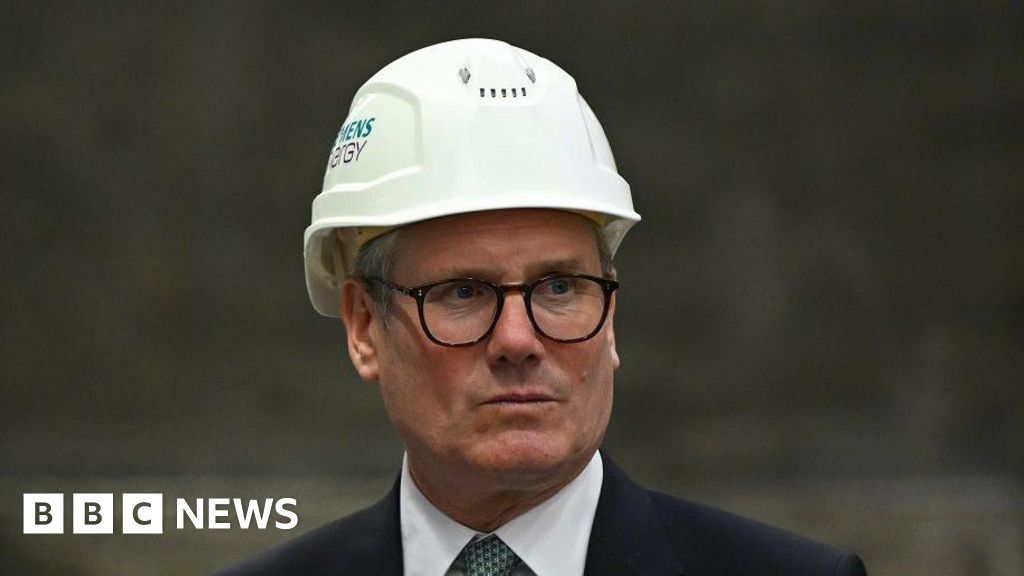
 Politics22 hours ago
Politics22 hours agoKeir Starmer facing flashpoints with the trade unions
-

 CryptoCurrency2 days ago
CryptoCurrency2 days agoBitcoin reclaims $60K and ‘this time is different,’ says analyst
-
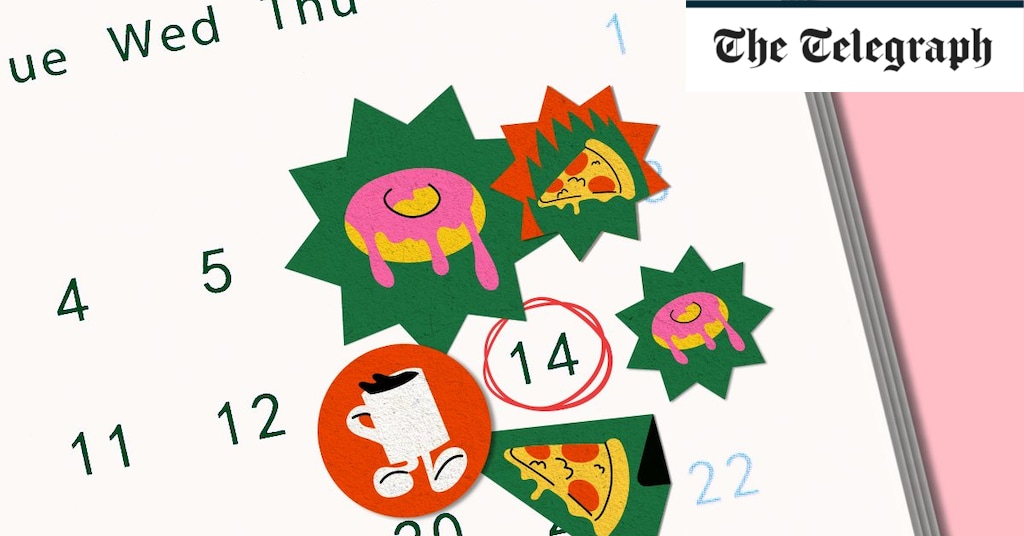
 Health & fitness2 days ago
Health & fitness2 days agoWhy you should take a cheat day from your diet, and how many calories to eat
-

 Technology8 hours ago
Technology8 hours agoFivetran targets data security by adding Hybrid Deployment
-

 Science & Environment1 day ago
Science & Environment1 day agoElon Musk’s SpaceX contracted to destroy retired space station
-

 Science & Environment2 days ago
Science & Environment2 days agoOur reality seems to be compatible with a quantum multiverse
-
News7 hours ago
Freed Between the Lines: Banned Books Week
-

 Technology3 days ago
Technology3 days agoMusician charged with using bots to boost streaming revenue
-

 Sport7 hours ago
Sport7 hours agoUFC’s Dan Ige feels confident after Diego Lopes dominates Brian Ortega
-
Business2 days ago
Music mogul Sean Combs charged with racketeering and sex trafficking
-

 MMA6 hours ago
MMA6 hours agoConor McGregor denies allegation he sexually assaulted woman at NBA Finals
-

 News2 days ago
News2 days agoStory Behind Ryan Murphy’s FX Show About Aaron Hernandez
-

 Science & Environment10 hours ago
Science & Environment10 hours agoThe physicist searching for quantum gravity in gravitational rainbows
-

 Football6 hours ago
Football6 hours agoFootball Daily
-

 Science & Environment10 hours ago
Science & Environment10 hours agoHow to wrap your head around the most mind-bending theories of reality
-

 Fashion Models6 hours ago
Fashion Models6 hours agoMiranda Kerr nude
-

 Fashion Models6 hours ago
Fashion Models6 hours ago“Playmate of the Year” magazine covers of Playboy from 1971–1980
-

 Fashion Models6 hours ago
Fashion Models6 hours agoNuméro Switzerland
-

 Health & fitness2 days ago
Health & fitness2 days ago11 reasons why you should stop your fizzy drink habit in 2022
-

 Politics5 hours ago
Politics5 hours agoLabour MP urges UK government to nationalise Grangemouth refinery
-

 Science & Environment13 hours ago
Science & Environment13 hours agoHow Peter Higgs revealed the forces that hold the universe together
-
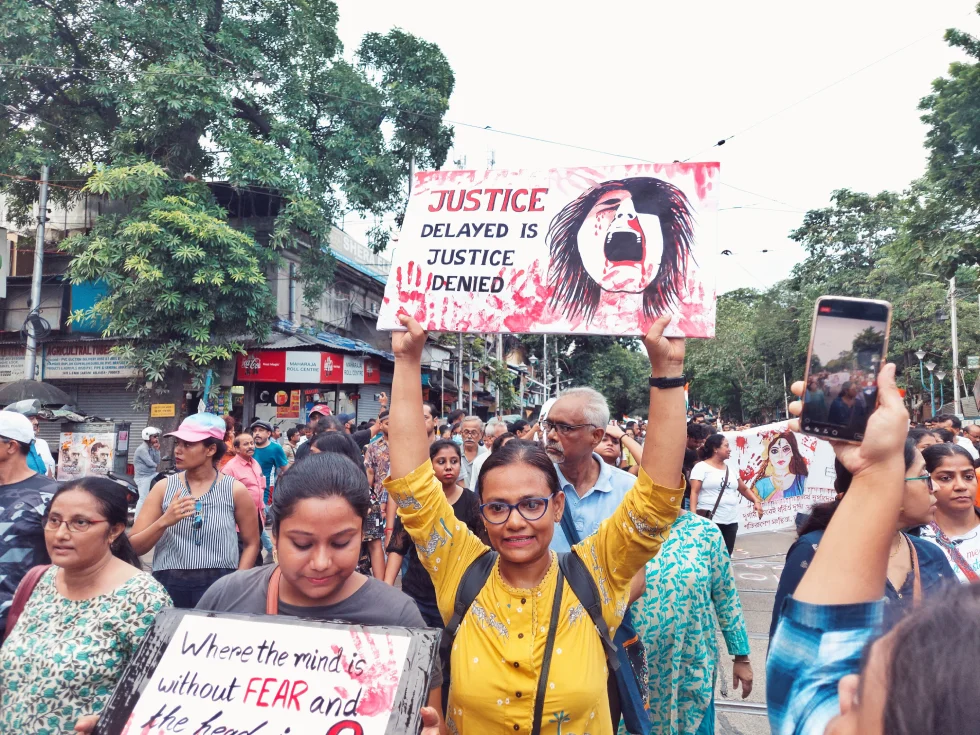
 News4 days ago
News4 days agoIndia Now Moves from Deliberations to Deliverables on Crimes Against Women
-

 Technology1 day ago
Technology1 day agoWhat will future aerial dogfights look like?
-

 Science & Environment8 hours ago
Science & Environment8 hours agoOdd quantum property may let us chill things closer to absolute zero
-

 Science & Environment15 hours ago
Science & Environment15 hours agoQuantum forces used to automatically assemble tiny device


You must be logged in to post a comment Login